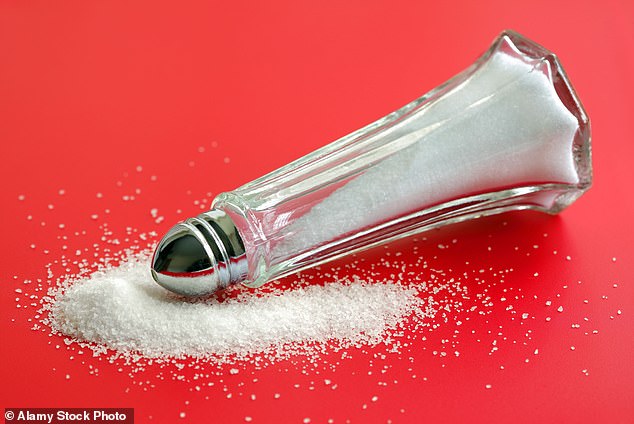Health warnings have been issued in three states due to ‘foreign material’ found in what was meant to be special purity food-grade salt.
The recall was pushed by the company itself, Compass Minerals America Inc, but this month, the US Food and Drug Administration (FDA) issued a more serious Class II risk classification.
The FDA’s Class II determination, set last Friday, means the agency has determined that ingestion of the contaminated salt ‘may cause temporary or medically reversible adverse health consequences.’
Roughly 148,000 pounds (67.08 metric tons) of contaminated salt was distributed in Maine, Indiana and Wisconsin, according to the FDA.
Bulk discount grocery giant Costco, which carries many of the salt products and the Wonder Brands bread products — including Country Harvest, D’Italiano, No Name and Great Value — also posted a recall over the foreign metal contamination.
‘If you have the affected product in your possession, do not consume it,’ Costco warned. ‘You may return the product to a Costco warehouse to obtain a full refund.’
A Compass Minerals representative said the company ‘sold the now-recalled products exclusively to business customers, all of whom have been notified.’

Urgent ‘ongoing’ warnings have been issued in three states, Maine, Indiana and Wisconsin , due to ‘foreign material’ found in what was meant to be special purity food-grade salt
CFIA authorities noted that an ‘ongoing food safety investigation’ is now actively tracing where else this tainted salt may have travelled along the food industry supply.
CFIA amended the Sifto brand Hy·Grade Salt metal recall notification to ‘include additional products,’ officials noted, including ‘Sifto Table Salt 1kg [2.2lbs].’
And myriad lot codes were provided for both the direct-to-consumer salt and food industry bulk salt packages, including three-packs of 1kg [2.2.lb] Sifto Table Salt, lots 3241007, 3241008, 3241009 and 3241011.
Consumers with concerns have been urged to visit FDA.gov , CFIA, Compass Minerals’ website and/or Wonder Brand’s site for further details.
In their response to DailyMail.com, Compass Minerals spokesperson emphasized that ‘no injuries have been reported’ yet, due to the metal contamination.
‘We have worked closely throughout the process with our BRCGS Global Standard for Food Safety certifying body, the Canadian Food Inspection Agency (CFIA), and the Food and Drug Administration (FDA),’ the company rep said via email.

While the original recalls did not specify what ‘non-organic, foreign material,’ had been discovered in the company’s bulk food salt, a later recall by the makers of Wonder Bread, which used the salt in their products (pictured), identified the contaminant as industrial metals

Further investigation by the Canadian Food Inspection Agency (CFIA) uncovered that smaller packages of food-grade salt used by average consumers – as opposed to food companies and restaurants – were also contaminated, which could likely impact US states as well
‘Compass Minerals takes this matter very seriously, as safety and quality are top priorities for our company,’ the spokesperson continued.
The firm verified it had initiated the voluntary recall on November 9, ‘after a [business] customer notified our company of metal fragments found in the food-grade salt it received.’
Customers in Canada have also been warned about the salt, fitting a recent pattern of food recalls in which products like MadeGood granola bars and frozen waffles sold at Walmart and Target have been recalled in both nations simultaneously.
Further investigation by the Canadian Food Inspection Agency (CFIA) uncovered that smaller packages food-grade salt used by average consumers — as opposed to food companies and restaurants — were also contaminated, which may impact US states.
While some of the original recalls did not specify what ‘non-organic, foreign material,’ had been discovered in the company’s bulk food salt, a later recall by the makers of Wonder Bread, which used the salt, identified the contaminants as industrial metals.
Metal contamination in fine-grain food additives have become a notable issue this year, industry-wide.
This past August, cinnamon rose to become one of the most recalled food items in America after being found to contain toxic metals linked to cancer.
That month, El Chilar, LLC, expanded its recall of ‘Canela Molida’ Ground Cinnamon after an investigation uncovered traces of lead, becoming the tenth cinnamon brand to be recalled for containing the toxic metal.
Officials have warned there is no safe level of lead — as it has been linked to behavioral issues, growth problems, and learning difficulties in children, hundreds of whom have been sickened by the compound in the past year.
And in adults, health agencies, like the FDA and CDC, have classified this metal as a possible carcinogen, noting that there is no safe level of lead consumption.
Short-term exposure to lead can result in symptoms that include headache, abdominal pain, vomiting and anemia. Long-term exposure may lead to additional symptoms, such as lethargy, weight loss, constipation and difficulty breathing.
This article was originally published by a www.dailymail.co.uk . Read the Original article here. .


